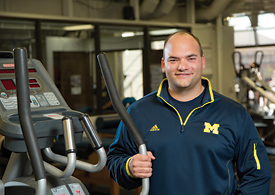As a former high school athlete and current staff athletic trainer for U-M’s Athletic Department, Jeremy Marra understood that all athletes have to overcome challenges. But until he worked with the Paralympic Games in London this year, he didn’t realize the full scope.
“Not to take away from what the Olympians or other athletes do, but at these games, they’re superhuman,” he says.

Photo by Scott C. Soderberg, Michigan Photography.
Marra was selected by the U.S. Olympic Committee for this year’s Paralympic Games, and in September, he flew to London and was set up with the adaptive rowing team. He and a physician took care of all of the American rowers, who varied in ability.
The American mixed-gender doubles boat that he cared for won bronze. Both rowers were bilateral lower extremity amputees — the male was a veteran who lost his legs in Afghanistan and the female had been adopted from a Ukrainian orphanage by an American and couldn’t walk for the first few years of her life. “Now they’re both Paralympic medalists. For them to mentally cope with their adversities, and then get into a boat and row to a medal? To help them get to that point and see them win, that was amazing,” Marra says.
“Working with athletes with disabilities gives you a different perspective on what dedication and hard work really means. It’s something I always want to be involved with.”
He was able to go to London because of his coworkers in the Athletic Department. “I couldn’t do it without their support — the university as a whole, the Athletic Department, and especially my peers.”
In the Athletic Department, Marra works specifically with the men’s and women’s lacrosse teams. “We’re adaptable by nature,” he says of his schedule with the teams. Mornings are spent at the general clinic, where all the athletic trainers see athletes from all of the sports, and then in the afternoons, Marra supervises the lacrosse practices specifically.
“Due to the nature of sport, we can’t prevent all injuries, but (when they happen), we’re there for the entire process, from the initial injury all the way to their return to play,” he says. “We get to heal with our hands basically every day. We have this chance to make a positive impact on the athletes on a daily basis.”
Marra and the other athletic trainers are completely embedded with their teams, traveling to all games and competitions. He likes to travel on his own, too, having visited 44 states and five Canadian provinces. “I enjoy immersing myself in new cultures and meeting new people,” says Marra, who has traveled to three different continents to work with athletes with disabilities.
He also participates in Search and Rescue, volunteering to assist lost and injured hikers. Marra often spends time outdoors, participating in hiking, kayaking and camping. He recently completed his first adventure challenge, the Tough Mudder, earlier this year. In October, Marra was awarded the James T. Neubacher Certificate of Appreciation from the Council for Disability Concerns for his work with athletes with disabilities.
Working with Division 1 athletics is fast-paced, but enjoyable, especially when he can work with athletic trainers still in school. “It is my hope the medical care I provide to athletes with disabilities will help young athletic trainers develop skills to provide care to athletes of all abilities,” he says.
The weekly Spotlight features faculty and staff members at the university. To nominate a candidate, please contact the Record staff at [email protected].

